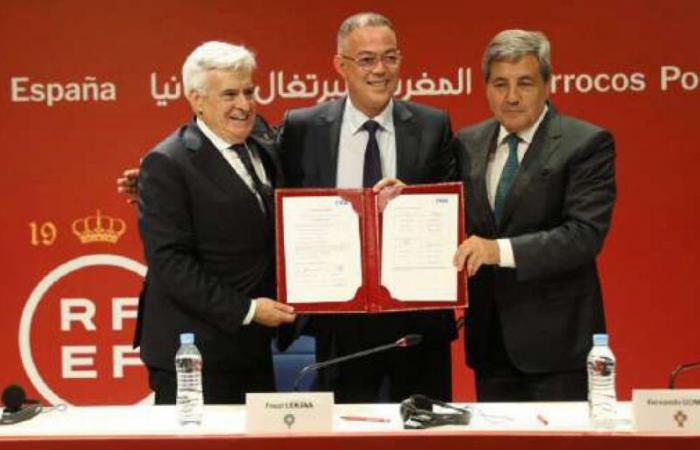Exemption from corporate and income taxes, VAT exemption, duty exemptions: discover all the tax advantages granted by Morocco to FIFA as part of the PLF 2025.
Exemptions from IS, IR, VAT, registration fees… Morocco’s attractiveness policy towards FIFA is being clarified for 2025. In the context of preparation for the 2030 Football World Cup, which will be co-organized by Morocco, Spain and Portugal, the Kingdom has just reached a decisive step.
The Finance Committee of the House of Representatives confirmed the adoption of a tax incentive regime in favor of the representations of the International Federation of Association Football (FIFA) in Morocco. Significant advantages but which call for particular vigilance in their application, comments analyst.
Total and permanent exemptions from IS
According to the presentation note of the 2025 Finance Bill, the main exemptions granted to FIFA and its representations in Morocco are six. Let’s start with the total and permanent exemption from corporate tax granted to FIFA representations in Morocco for their activities in accordance with the statutes of the organization. This is one of the flagship measures of this tax incentive system.
Unlike the temporary exemption regimes that exist in Morocco for other sectors, the one granted to FIFA is permanent and without time limitation. This gives great visibility and long-term fiscal stability to the FIFA representations established in the Kingdom. The exemption, however, only concerns activities and operations directly linked to the object and statutes of FIFA. This therefore excludes in principle purely commercial or lucrative activities which are not linked to the promotion and development of football.
Remember that in Morocco, the corporate tax rate varies from 15% to 33% depending on the bracket of net income. The government plans an alignment at 20% for net results below 100 million dirhams by 2026. With such corporate tax rates, this measure represents a considerable tax saving for FIFA on its profits made locally. This will further strengthen the Kingdom’s attractiveness as a regional operational base for the federation. However, “the tax authorities will probably have to put in place rigorous control to ensure that only statutory activities benefit from the exemption. A legal framework and clear procedures must also be defined for this purpose,” underlines an analyst.
Exemption from withholding tax on distributed dividends
The exemption from withholding tax on dividends distributed by FIFA representations in Morocco to FIFA itself or to its affiliated entities is another key measure of the tax incentive regime. Normally, dividends paid by a subsidiary in Morocco to its non-resident parent company are subject to withholding tax at the rate of 12.5% in 2024, 11.25% in 2025 and 10% in 2026. This This exemption therefore makes it possible to avoid this taxation and to repatriate all of the profits made locally to FIFA or its affiliates abroad, without tax.
This measure is part of the logic of prevention of double taxation that Morocco seeks to offer to FIFA. Repatriated dividends will only be taxed once, in the country of residence of the federation (Switzerland), thus avoiding double economic taxation. Beyond the tax savings, this exemption will facilitate the circulation of financial flows and the mobility of capital between the different entities of the FIFA group. This will provide them with greater flexibility in managing their overall cash flow.
FIFA and its foreign affiliates will not pay tax in Morocco on income received
The exemption from withholding tax on remuneration paid by FIFA representations in Morocco to FIFA itself or to its non-resident affiliated entities is another flagship measure of this exceptional tax regime.
Normally, sums paid by a Moroccan company to non-residents (natural or legal persons) are subject to withholding tax. With this exemption, FIFA and its foreign affiliates will therefore not pay tax in Morocco on the income received (services, royalties, management remuneration, etc.).
This measure will greatly facilitate the movement and provision of qualified personnel between the different entities of the FIFA group. Remuneration and salary costs can be shared and re-invoiced internally without Moroccan taxation. For certain types of high value-added services, non-resident withholding taxes can reach 30% in Morocco. The exemption therefore represents a very substantial tax advantage to optimize FIFA’s human resources management at the regional level.
Exemption from domestic and import VAT
The exemption from domestic and import VAT on goods, materials, merchandise, services and operations linked to the statutory activities of FIFA and its representations in Morocco is another major measure of this exceptional tax regime.
This provision grants a total exemption from VAT (normal rate of 20% in Morocco) on all purchases, acquisitions and imports made by FIFA for its operational needs in Morocco, in accordance with its statutory purpose. This is a very substantial benefit in terms of cost savings. By removing VAT, this will greatly streamline FIFA’s local operations. No VAT recovery formalities to carry out, nor cash flow lag problems linked to the initial payment of the tax.
This exemption will be particularly advantageous for the organization of sporting events such as football matches or competitions in Morocco. All related purchases (equipment, services, etc.) will be completely tax-exempt.
Exemption from registration and stamp duties
The exemption from registration and stamp duties for all acts carried out by FIFA representations in Morocco, including residence permits for their staff, is another facet of this advantageous tax regime.
This measure covers all registration and stamp duties to which FIFA may be subject in Morocco. This concerns acts relating to the formation of companies, real estate acquisitions, leases, contracts, etc. But also the residence and work permits of its expatriate staff. In Morocco, registration fees on deeds vary from 4 to 6% of the value in question.
On real estate transactions or large amounts, the tax savings will be substantial for FIFA. The exemption on residence and work permits is a real plus to facilitate the establishment and rotation of FIFA expatriate staff in Morocco, without additional administrative or tax burdens.
Exemption from IR for foreign staff
The exemption from income tax for foreign personnel employed by FIFA representations in Morocco is a very advantageous tax measure of this exceptional regime. This provision grants a total income tax exemption to foreign expatriate employees and staff working for FIFA in Morocco.
Their remuneration, bonuses and benefits in kind will therefore not be taxed locally. This tax exemption will make Morocco much more attractive in the eyes of international executives and experts that FIFA would like to attract and employ in its local offices. Their net salaries will be increased accordingly. This will also greatly facilitate mobility and staff rotations within the FIFA group on a regional scale, without complex tax issues to manage.
It must be said that many international organizations already benefit from such a privileged tax regime for their expatriate staff in host countries. Morocco would thus align itself with these practices. Some, however, express their fears that this tax loophole will increase the attraction of foreign talents to the detriment of national skills, creating an unfavorable draft.
A multidimensional attractiveness strategy
By granting these major tax advantages, the government is pursuing several strategic objectives. First of all, strengthen the Kingdom’s image as a serious destination for international organizations, particularly in the run-up to the 2030 World Cup which it will co-organize. Then, stimulate foreign direct investment and the development of sports infrastructure on its territory.
This strategy of targeted exemptions is therefore part of an overall economic policy aimed at diversifying sectors of activity, attracting productive investments and developing local expertise. Similar incentives already exist for research centers, offshore holding companies and even export processing zones. Ultimately, the exemptions granted to FIFA demonstrate Morocco’s desire to position itself as an attractive regional economic hub.
Bilal Cherraji / ECO Inspirations






